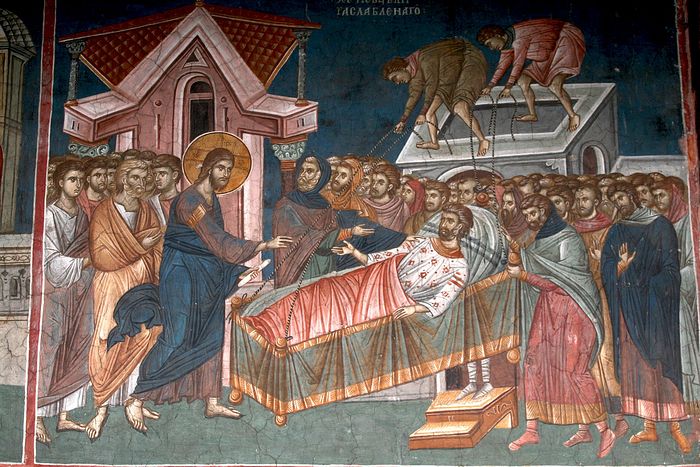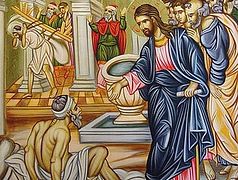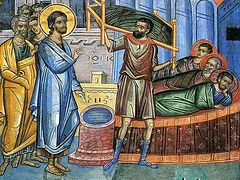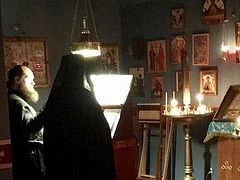The Reading from the Holy Gospel according to St. Mark. (2:1-12)
One can only imagine the scene at Capernaum that is mentioned in today’s gospel reading. When people heard that Jesus was there, the crowds once again swelled and there were so many people present to see and to hear the Word of God that they could no longer be contained in the house but overflowed outside. Whenever the Lord Jesus travelled from place to place it was considered a great event at that time. He had a greater following than the Beatles or the Rolling Stones (and without hysterical teenage girls).
In the midst of this scene we are witnesses to an amazing story of friendship and the love of God. Four men have come carrying their paralyzed friend. We don’t know exactly how far they’ve travelled but we can be sure that it has been a struggle to carry their friend the whole way. These men showed a lot of love for their friend but their love would be tested further. When they arrived at the scene in Capernaum, they found that there were so many people there that there was just no way to bring their poor, sick friend to the Lord Jesus. At least there was no conventional way to do it.
One of the beautiful things that we learn from the lives of the saints is that there is not one right way to live the life of a saint or become a saint. Each one of the saints is unique and while they all have certain aspects of their struggles in common, each one must find their own unconventional ways to get to the Lord Jesus. These four men did just that. They decided that if there was no way through the doors and the windows of the house, they would have to look up. They decided that the best course of action would be to drop in from the ceiling by uncovering part of the roof of the house. Of course at this time we are talking about vastly different construction.
The men did just that and hoisted their friend up high in order to uncover a spot on the roof and let him down to meet our Lord Jesus. Now, and this is important, the man who was paralyzed never said anything to Jesus. It was the Lord who looked upon the faith of his friends and said to him “Son, your sins are forgiven.” It reminds us that our faith is powerfully beneficial to others. In fact, this is exactly what we do when we baptize infants. We take the faith of their parents and godparents and we ask Jesus to see that faith and to count it towards the one who is brought to Him, that is to His body, the Church. If the Lord Jesus acted in this way for this man, can there be any doubt that the Lord will accept our faith as well?
Now in the course of this story we see something amazing. Initially, the Lord does not heal the paralyzed man of his paralysis. We might find that to be a bit strange. If you put this man in his paralyzed condition before a group of physicians, and we asked the doctors “what is wrong with this man in your opinion?” I am sure that the physicians would tell us that the problem with this man is his physical ailment. While that is certainly true, it is not the problem according the Lord Jesus. According to Jesus, the most important issue that needed to be addressed was the underlying sins that this man was carrying.
He begins by healing the man’s soul through granting forgiveness of his sins. As we are in the midst of the great and holy fast, we are reminded that physical strength and physical healing means very little if we are spiritually paralyzed. And we would all be spiritually paralyzed if not for the mercy of Jesus Christ towards each of us. We experience this powerful forgiveness of sins in baptism and we continue to experience it through the sacrament of confession and the life of the Church. Wholeness, health and sanity start with the forgiveness of sins. Through our own struggle to repent and be purified of our sinful habits and passions, we can fully participate in the healing forgiveness that God provides. This is what we are doing during these holy forty days. Struggling to repent in a more serious, more strenuous way. This repentance is the foundation of our path to real, actual knowledge of God which comes by His grace.
On this, the second Sunday of Lent, we commemorate St. Gregory Palamas. One of the most important things that we take from his teaching is that one must be struggling through the ascetic life of fasting and fervent repentance to grow in purity and in prayer. This, according to St. Gregory, will bring the faithful to a true and genuine experience of God and allow them to partake of His divine nature by the grace of the Holy Spirit. So in the Orthodox Christian way of life, we find that forgiveness of our sins is a powerful starting point not only to physical health, as we saw with the paralyzed man, but it is the starting point to inheriting the very treasures of the kingdom of God. We go from paralysis to walking, from being poor to being spiritually rich, and from death to resurrection and glory with Christ our God who rose from the dead in glory.
Whether you are in a wheelchair or you can walk perfectly, none of that matters if we are spiritually paralyzed. But if we have the grace of God powerfully working through us because we are humbly, dilligently, courageously struggling to repent, to pray and to grow in the knowledge of God this is the mark of true health and the sign that we are living up to our purpose as saints and bearers of the light of Christ, to Him alone be all glory with His Father and the Holy Spirit AMEN.





